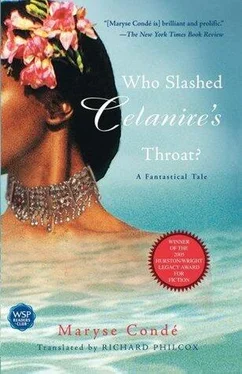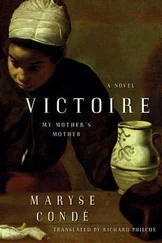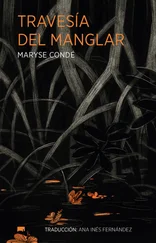In a state of frenzy, he set out for the landing stage on the other side of Bingerville. A mob of small traders carrying calabashes and makeshift basins brimming with unrefined palm oil was already laying siege to the warehouse. The smell of grease mingled with that of the decomposing mud and humus. All around, the banks appeared strewn with bones, in actual fact dead tree trunks bleached by the sun and the brine. Hakim seated himself in the outboard. Bordered by dense foliage, the blackish waters of the lagoon lapped threateningly against the landing stage. He had always been scared of water. As a child, after his papa had left him, he had only to close his eyes to imagine himself slipping slowly into a bottomless lake and drowning. He shivered. Celanire was like the lagoon, cunning and dangerous.
But the day turned out to be so busy, he completely forgot about the oblate.
The day before, the vessel Alexandrie had fired a cannon shot, indicating that it was ready to trade. While maneuvering along its side, one of Betti Bouah’s boats had overturned. Four men had been sucked under the waves and their bodies kept for good by the ocean. Hakim had had to smooth out the accusations and greed of the families and negotiate compensation. The Europeans had introduced a new system. Everything had been calculated. A man who left behind small children was worth so much. A man who left a betrothed, so much. Several wives, so much. It was nighttime before he returned to Bingerville. An invitation was waiting for him. The following Sunday Koffi Ndizi was going to be baptized, and as a token of their former friendship, he was inviting him to the ceremony.
Hakim had never taken Koffi Ndizi’s amorous transports very seriously. Like those of Karamanlis, he got the impression they were sheer lunacy that would heal by itself. But when he saw him standing at the foot of the altar, his hands piously crossed over a thick candle, his braids shaved, and his belly cramped into a white chasuble, he realized his mistake. To go to such extremes, he really had to be smitten. Queen Tadjo, sitting in the front row, seemed to be in agony. He had given her three months to become a Christian. Otherwise, despite all her line-age, he would repudiate her as well.
The church, which dated back to the early days of the colony, was a reminder that the missionaries had followed in the steps of the traders. The altar and the pews had been carved out of ironwood. A local artist had sculpted in clay the fourteen stations of the cross. On that particular day there was the usual lot of “converted” natives and French religious crackpots. In addition, a crowd of Africans was bent on seeing with their own two eyes the extraordinary sight of a king turning his back on the traditions of his ancestors. Those who could speak French fervently sang:
Je crois en Toi, mon Dieu,
Je crois en Toi,
L’ombre voile mes yeux,
Mais j’ai la foi.
The others listened, intimidated by the sonority tumbling from their mouths. The father superior, a Knight Templar, was an ascetic, nothing more than skin and bones, once a great friend of Thomas de Brabant, who often used him as an interpreter. For Koffi Ndizi, baptized Felix, he delivered a long homily, stressing his rebirth and his duties as a Christian. Adopting an inspired look, he prosaically exulted in a conversion that compensated for the defection of his former friend Thomas, up to his neck in adultery with a Negress. The new Felix fittingly received the water on his forehead and solemnly ate the salt. After the ceremony the guests gathered at the royal compound where the free-of-charge domestics who had replaced the slaves served lukewarm lemonade in the famous blue-stemmed glasses. Hakim’s eyes filled with tears as he found himself back in that place, that theater of so many sweet moments: drinking bouts, never-ending palavers, and anti-French dreams. Now that the Father Templar had asked the learned assembly of sébékos and fetish priests to vacate the compound, their courtyard was deserted. The only witnesses to the past were the queen mother, stripped of half of her suite, and a few elders who had nowhere else to go. Poor Kwame Aniedo! His father had ordered him to convert, swearing he would disinherit him if he refused, for his mentors had forbidden him to bequeath his estate to a heathen.
As a consequence, Kwame Aniedo had not attended the ceremony and was locked up in his hut, amusing himself as best he could playing awalé with his favorite concubine. At the very moment the cookies and white wine were brought out, Thomas de Brabant arrived in full uniform and delivered a grand-sounding speech. Noblesse oblige! The king’s conversion to the True God was an event of paramount importance with promising consequences for the future as well as a productive collaboration for prospective relations between Africa and Europe. It was almost as if Celanire had dictated the words to him, they were so close to her ideas. Exasperated, Hakim was about to take his leave when Celanire herself arrived, accompanied by her inseparable widow Desrussie. Felix Koffi, the new Christian, who could now put together a few words of French, rushed toward her: “Ça wa ben? Ça wa ben?”
It was pathetic!
Celanire was decked all in white — dress, shoes, and hat — as if it had been her baptism. Around her neck, a choker of white velvet embroidered with tiny multicolored flowers. She thus appeared the most virginal of virgins. She gave a discreet nod to Hakim as if, a few days earlier, her hand had not groped around inside his trousers, and lavished Felix Koffi with smiles. What were her plans for the fat lump? What was she hoping to fleece him of?
Hakim did not have to wait long for an answer.
Three days later, Betti Bouah informed him that Felix Koffi had made a gift of his land neighboring the Ebrié lagoon to the Home for Half-Castes — a good dozen acres in all. The gift was especially shocking as the tribe’s land did not actually belong to the king. He was merely the guardian on behalf of the community. Which counsel of elders had he consulted for permission? Betti Bouah worked himself into a frenzy and even considered disinheriting his cousin. There was no longer any justice. The native courts under the thumb of Thomas de Brabant did everything the French dictated.
Surprise! Surprise! Kwame Aniedo proved he was a true Akan and had no intention of turning his back on the gods of his ancestors. Refusing to convert, he left the royal compound. Betti Bouah took him in, gave him a room next to Hakim’s, and offered him a job. But Kwame Aniedo had no intention of working himself to death, he who already saw himself in a white-collar job in Dakar, and as an excuse said he needed all his time to prepare for his examination. As a result, Hakim’s torture started up all over again. Every day he came face-to-face with Kwame Aniedo. He would even come home to find Kwame lying on his bed, leafing through his books and smoking his Virginia tobacco, wearing the bathrobe he had bought at the CFAO company store with his savings. For the prince had no notion of private property and helped himself to anything he pleased. The real torture, however, was to hear him again night after night groaning with pleasure with his female conquests, who were still just as numerous.
5
The year was drawing to a close, and the short rainy season, the one that lasts from October to November, had just begun when the inhabitants of Bingerville debated a subject of conversation of the utmost importance. Charlotte, the wife of Thomas de Brabant, had arrived with her daughter. So the question was who was the loveliest — Celanire or her? Celanire had no particular reason to be jealous of her white rival. Some even dared to prefer her, being of the opinion that Charlotte was melancholic and did not smile enough. Whereas Celanire, vivacious and gracious, was exquisitely polite on the rare occasions they met her in person. The Africans considered that both of them needed filling out, but conceded that Celanire concealed a little more in the places where it was needed. The general opinion was that Charlotte dressed better in the Paris fashion. But Celanire sometimes wore dresses and head ties in the Akan fashion, which the Africans appreciated. In short, opinions differed.
Читать дальше












